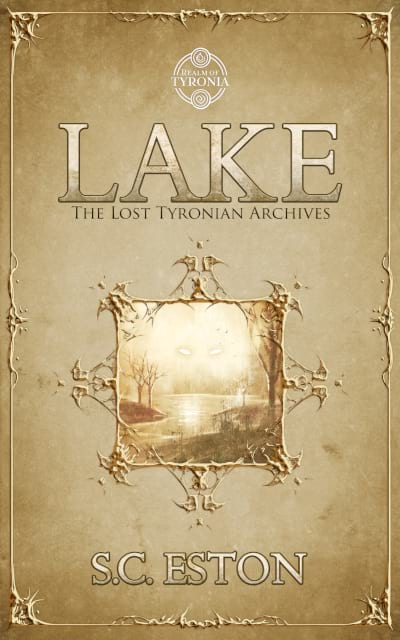The Treasure Trove...
Editor Kira Rubenthaler
This is the first in a series of special posts related to my new book: The Stranger of Ul Darak.
It's my pleasure to introduce you to Kira Rubenthaler, from Bookfly Design, my editor. I've worked with Kira on a few of my books and the quality of her editing and her attention to details are unequalled. In this interview, Kira shares with us a bit more about her approach and her experience on editing The Stranger of Ul Darak.
What process did you follow to edit The Stranger of Ul Darak?
Kira: With every book I edit, I start off “tidying up” the manuscript. Using Word’s search function, I look for things like extra spaces, double hyphens that didn’t turn into em-dashes, spaced em-dashes, and three periods that didn’t turn into the ellipsis character. Then I start reading, but reading to edit is very different than reading for pleasure. I’m naturally a fast reader, but I read very slowly when editing to make sure I’m reading every word and not skipping over anything. As I read, I make a list of names (people, places, objects, creatures) so I can refer to it to check that the spelling and capitalization stays consistent throughout the book. (This is especially important in a book like The Stranger of Ul Darak, where a lot of names are invented or nonstandard.) Essentially, I’m reading the book from start to finish, but I often reread sections that I feel need a bit more attention or go back in the book to double-check something. I also frequently read out loud to “hear” how the writing sounds.
I use Word’s track changes feature so the author can see every change I’ve made. When copyediting, I am, of course, looking for errors in spelling, punctuation, and grammar, but I’m also keeping an eye out for inconsistencies, clunky or unclear wording, and overuse of specific words. I fix spelling and grammar errors directly in the manuscript, but with points of confusion, repeated words, or other stylistic problems, I make a comment (using track changes) explaining the issue and suggesting ways to fix it. It’s important to me that the author maintains his voice and unique style, so that’s why I tend to make comments rather than changing the actual wording myself. That way, the author can review my feedback and decide how to best fix the issue—or even if it’s an issue that needs to be fixed. I made over 1,000 comments on the manuscript for The Stranger, which might sound like a lot, but that’s pretty standard for a book this long.
 Question from a Red Dragon Insider Reader:
Question from a Red Dragon Insider Reader:
What do you enjoy the most about editing?
Kira: I’ve always been a voracious reader and long dreamed of being a writer, and with a background in journalism and teaching high school language arts, editing comes naturally to me. Errors bug me, and I take satisfaction in finding a missing word in a sentence or catching that the author wrote “later” when he meant to write “latter.” (I’ve obsessively reread and tweaked my answers to these questions, and I could probably edit them forever, but at some point you have to call a piece of writing done!) I also enjoy helping authors polish their writing. I’m lucky enough to work with a crop of very talented writers, and it feels good to be able to help them make their books even better. It’s also been rewarding to see some of the writers I work with go on to be very successful.
Tell us about your path to becoming an editor.
Kira: My partner and I started offering editing and cover design services as Bookfly Design in 2013. A couple years earlier, as self-publishing started really taking off, I’d read an article in Time magazine about successful self-publishing authors. (I wish I could remember which authors were featured in that story.) The article explained that self-publishing authors have to handle all the tasks that a publisher would normally take on and mentioned that each of the authors had spent a couple thousand dollars for editing, cover design, formatting, and other pre-publishing tasks. I remember thinking, Wow, we could offer those services. (At the time, my partner was working for a company designing audiobook covers, and I was teaching high school language arts after several years working for newspapers.) Fast forward a couple years and we began offering cover design and editing to indie authors on the side. We started off slowly, but then more authors were hearing about us via word of mouth and things started to snowball, so we ended up doing Bookfly full-time.
Do you have a favorite book?
Kira: I’ve always found it impossible to pick a favorite favorite book. When I was a kid, I would have said the Anne of Green Gables series. Or Little Women. Or the Little House on the Prairie series. When I was in college, I used to answer Tisha (by Anne Purdy, as told to Robert Specht). It’s the true story of a young woman who takes a job as a schoolteacher in the Alaskan wilderness, and I’ve read it over and over again. As for the science fiction/fantasy genres, I’ve always loved dystopian fiction (1984, The Handmaid’s Tale, The Road, The Hunger Games, The Giver, Lord of the Flies)—and there are a lot more dystopian titles on my TBR list. If I had to pick a favorite genre, I might go with historical fiction. I’m currently reading Kristin Hannah’s The Four Winds, and it’s fascinating to see what life was like during the Dust Bowl era and learn how poorly the migrant workers were treated when they came to California. That’s what I love about a good book in any genre: it transports you to a different time and/or place and you get to experience life—the bad and the good, the ugly and the beautiful—through a whole new set of eyes.
About Kira Rubenthaler
 I've been devouring books since I learned to read at the age of three, and I've wanted to be a writer for as long as I can remember. In college, I earned minors in creative writing and Spanish while completing my bachelor’s degree in journalism and mass communication, and I later went on to obtain a Master of Arts in Teaching, English Education. My career path has always centered around the written word. Over the last twelve years, I have worked as a proofer, a reporter, a newspaper editor, and a high school English teacher, while continuing to read voraciously and write fiction in my free time.
I've been devouring books since I learned to read at the age of three, and I've wanted to be a writer for as long as I can remember. In college, I earned minors in creative writing and Spanish while completing my bachelor’s degree in journalism and mass communication, and I later went on to obtain a Master of Arts in Teaching, English Education. My career path has always centered around the written word. Over the last twelve years, I have worked as a proofer, a reporter, a newspaper editor, and a high school English teacher, while continuing to read voraciously and write fiction in my free time.
Connect with Kira Rubenthaler from Bookfly Design
 About The Stranger of Ul Darak
About The Stranger of Ul Darak
Sometimes saving a world means rebelling against it.
In an age long forgotten, nineteen hundred and eighty-three Seals were forged—magical disks placed around the world to repel the cosmic chaos beyond.
In the centuries that followed, the Sentinels were tasked with protecting those Seals. For countless generations, they succeeded.
Until now.
At six years old, Shéana is recruited to the order of the Sentinels. A decade later, she displays powers unlike anything any Sentinel has shown before. When she feels the world stirring in pain, she knows the shield surrounding Tyronia has been breached. The great chain is broken. And the order of the Sentinels lies in discord.
In the isolated village of Valdur, young Arth struggles to belong. Spurned by the other children, he ventures south to the endless mountains, and the strange barrier marking the edge of existence. The Final Horizon. Here he witnesses the impossible: a man emerging from beyond the veil—where nothing can possibly exist. A man Arth knows he must protect.
Now the fate of two worlds rests on a knife’s edge. Only the courage of a village boy and the power of a fledgling Sentinel can save them.
But to save their worlds, they must reject all they’ve been taught, leaving behind everyone and everything they’ve ever known.
Get The Stranger of Ul Darak
Would you like to receive these interviews directly in your inbox?
Simply join my newsletter, the Red Dragon Insider. You'll also get a FREE story as a thank you.
Keywords: Editors , The Treasure Trove , Tyronia , Writing
Also in the Series: The Treasure Trove
- The Treasure Trove... Author A. W. Davidson (August 9, 2022)
- The Treasure Trove... 'The Drift' by Author Casie Aufenthie (October 17, 2022)
- The Treasure Trove... Author Frasier Armitage (January 10, 2023)
- The Treasure Trove... Author Brittany Johnson (February 3, 2023)
- The Treasure Trove... Author S. Z. Attwell (June 18, 2023)
- The Treasure Trove... Author Paul Jameson (October 22, 2023)
- The Treasure Trove... Editor Kira Rubenthaler (November 16, 2023)
- The Treasure Trove... Artist Tom Edwards (November 18, 2023)
- The Treasure Trove... Alpha Reader Gaetan Clement (November 29, 2023)
- The Treasure Trove... Artist Sarah Obtinalla (December 8, 2023)
- The Treasure Trove... 'Journey to the Hopewell Star' by Hannah D. State (February 23, 2024)
- The Treasure Trove... 'Marked' by R.M. Krogman (May 28, 2024)
- The Treasure Trove... 'Crossing the Churn' by Jane Tims (June 24, 2025)
- The Treasure Trove... 'TeleExorcist' by Brittany Johnson (January 10, 2025)

 Join the Red Dragon Insider
Join the Red Dragon Insider
And get a FREE story!
Lake is a side short story to my epic fantasy series The Lost Tyronian Archives.
Enter your email for news, exclusive offers, upcoming releases, recommendations, and your free story.
Leave a comment or question here. Your email will NOT be published.